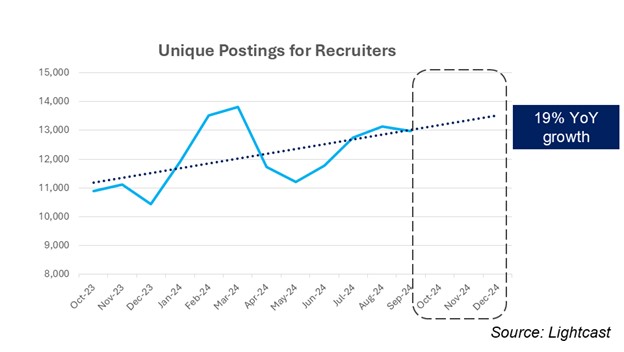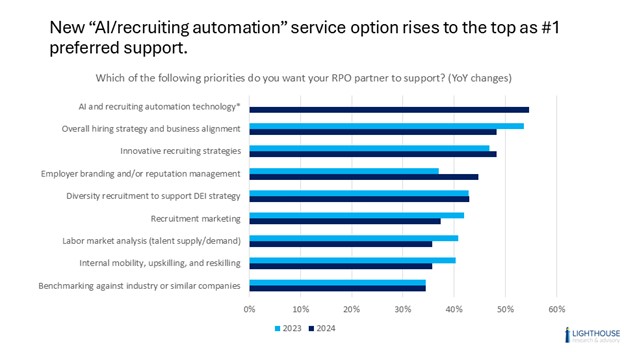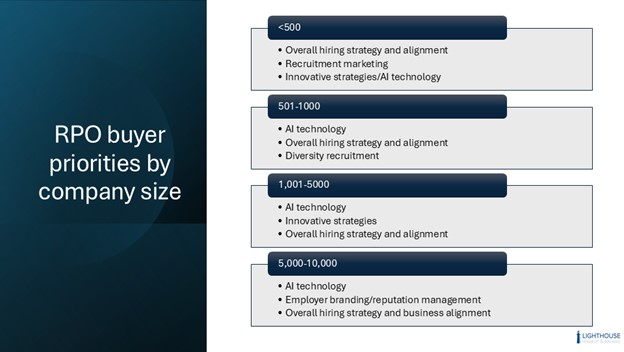In a world where hiring seems to be harder than ever, employers are looking for any solution that helps to reduce pain points, improve candidate experience, and deliver more predictable recruiting outcomes. A key strategy many are considering?
Recruitment process outsourcing.
Over the last few months, RPO has been one of our top focus areas for research at Lighthouse Research & Advisory, and we’ve spoken with more than a dozen different firms about what they’re working on and how they are serving the market. For instance, Jonathan Kestenbaum at AMS shared some of their perspective on using AI to support human-centered hiring outcomes, which is a differentiated approach in the market today (see some of the research findings below for reinforcement of this concept). I heard some similar inputs from AMS’ Kiera Pintao, Global Head of Employer Brand Advisory, on a recent webinar panel as she talked with me about their approach to the overall hiring process using structure and flexibility to meet the needs of every candidate.
In a separate discussion, Rebecca Volpano from Cielo talked with our team about Cielo Talent Cloud, the technology underpinning to their services that allows scalability, flexibility, and support across their entire client base. This means that the team can deliver advisory and more strategic recommendations beyond “just” filling positions, which is one of the top priority services that employers want today. Employers are increasingly asking for “innovative recruiting strategies” as part of their RPO relationships, and Rebecca and her team are leaning in to deliver.
What the Research Indicates
While the RPO and overall recruitment markets have been relatively slow (especially compared to the rapid pace of 2021 and 2022), there are signs the market is rebounding. One proxy that we watch closely is the number of job postings for recruiters. Companies have to hire recruiters before they hire other staff, and according to data from Lightcast, the number of postings is up 19% YoY from October 2023 to Sept 2024.

This indicates a recruiting recovery, and it offers a hope that 2025 is going to return to a more normal hiring market in a non-election year.
With regard to the 2024 RPO Buyer Value Study, performed in partnership with the RPO Association, the research on RPO buyers that our team developed covers more than 500 organizations, with 300+ of them being RPO users and the other employers (nonusers) serving as a comparison data set. So, what’s happening in the market?
For starters, RPO buyers are leaning into AI in a powerful way, as the graph below indicates.

This year we offered AI as an option, slightly redefining the previous “technology optimization” category, and it jumped immediately to the top of the list of priorities for employers. This tells us a few things:
- Employers want their RPO to leverage AI. In some cases, having a partner using AI means the company can circumvent overly stringent IT or security policies.
- Employers are 3.5x more likely to say they want their RPO partner to leverage AI than to avoid it. In other words, RPO buyers are looking to their service partners to cut through the AI hype and technology clutter to bring real results.
- Several of the employer/buyer panelists at the event said that AI education is an area that RPO providers should be supporting to the degree that it speeds up hiring, improves quality, or otherwise enhances the service they would receive.
The interest in AI is high across the board, but each company size segment has a slightly different set of overall priorities.

We work with employers that need this data to help them speed up evaluations and quickly hone in on a business case for RPO, and we also support RPO providers that want deeper insights into industry-specific needs from an RPO demand perspective.
Because of that, we consistently see strong demand for broader support like “innovative recruiting strategies” and “overall hiring strategy and alignment,” and this year is no different. However, clearly the effects of AI adoption into the overall hiring technology stack is now bleeding over into the services side of how companies receive hiring support.
The bottom line is that RPO can no longer be run efficiently purely as a service-based approach. The market is driving this to become an technology-enabled service at a higher level than ever before, and it shows in how buyers are considering and evaluating the potential partners they will work with.
Ben Eubanks is a bestselling author, speaker, and researcher living in Huntsville, AL. He spends his days as the Chief Research Officer at Lighthouse Research & Advisory, developing groundbreaking research on workforce trends and examining the talent technologies and People practices that set great organizations apart from the rest.
His latest book Talent Scarcity explores why companies are having difficulties finding quality talent and how they can solve it. His first book, Artificial Intelligence for HR, is a guide to leveraging technology to create a more human experience for the workforce. He also hosts We’re Only Human, a podcast focusing on improving human resources, one HR pro at a time. When he’s not speaking or writing, he spends time with his four kids and runs in a variety of outlandish races for fun.


